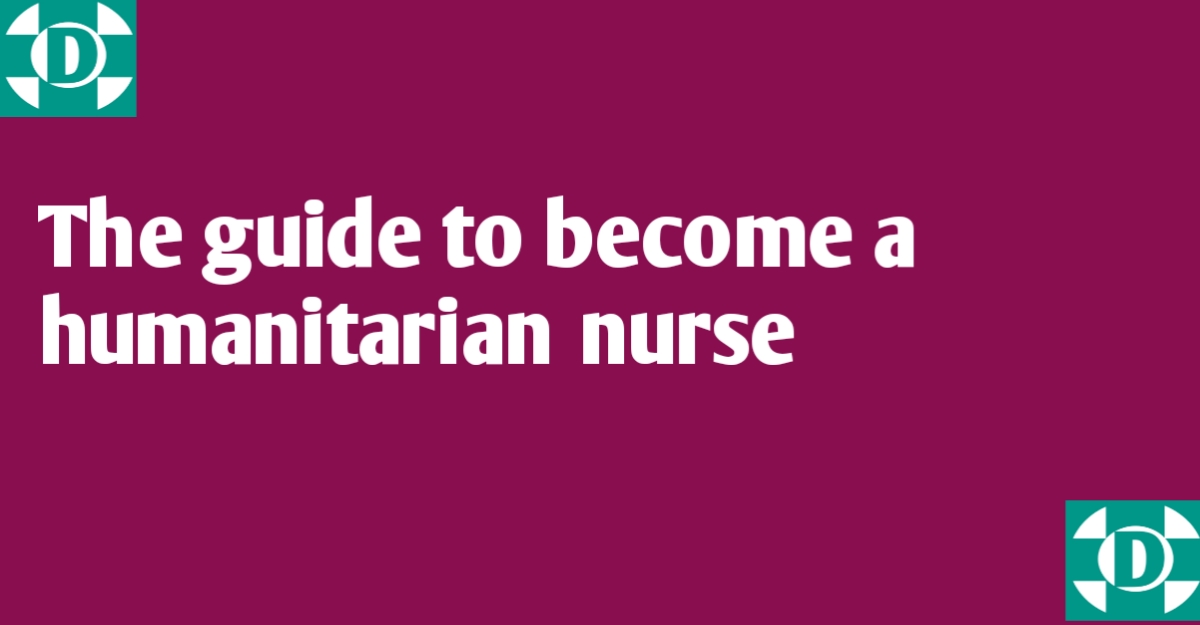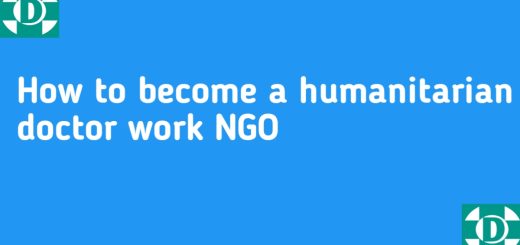The guide to become a humanitarian nurse

Simple steps to become a humanitarian nurse
Nurses, play a very important role in saving life of vulnerable people in humanitarian settings.
These people may be in need of medical care, food, clothes, shelter to survive.
Humanitarian nursing is known as giving care to people in need who are affected with medical emergencies, disaster or arm conflict.
Humanitarian nurse, is a nurse that is working in a humanitarian setting to provide critical nursing care to people who are in a catastrophic condition.
However, humanitarian nurse can respond to emergency in any place or situations when there is need not only in humanitarian settings.
The aim of the assistance is to alleviate suffering, prevent further damage and save life.
Working as a humanitarian nurse is very rewarding, enjoyable and also changes. These nurses uses their medical skills to help people in need.
According to the Medicine Sans Frontiers (Doctors Without Boarder), generally, nurses provide 80 to 90% of healthcare world wide. As a result you can understand that the world still need nurses.
In this simple to understand article I will show you step by step guide to become a humanitarian nurse.
But before we go further let’s discuss about some key points
The Humanitarian: Refers to the act of helping people who are in need to promote their well-being and alleviate their suffering.
Humanitarian aid: Refers to the specific assistance support of materials provided to the people in need during crisis or emergencies.
meaning of Humanitarian organization: Humanitarian organization are international, independent, humanitarian, non-governmental organizations that give aid to the people who are suffering, particularly victims of armed conflict, famines, and natural disasters. Sometimes these organizations are also called relief societies.
Understanding the above key points will help you to understand all you need to know about humanitarian nurse.
Read also: What is humanitarian, aid, principles, and challenges?
Who is a humanitarian nurse?
Humanitarian nurse is a qualified registered nurse, who obtain a specialized training with a humanitarian non-governmental organization to provide critical care to individual, community, group of people who are in emergency situations.
However, humanitarian nurse provides these care to the people regardless of their age, cultural background, religious, economic status and based on medical ethics, respecting their rights and dignity.
The aim is to save life, alleviate suffering and prevent further damage to peope.
Humanitarian nurse was trained to respond to catastrophic situations such as natural disasters and armed conflicts, these nurses apply their expertise in providing holistic care under the most challenging conditions.
Most nurses nowadays need to use their skills and knowledge in humanitarian setting to help those people in critical situations.
About 75% of young nurses want to work with non-governmental organization such Medicine Sans Frontiers, International Rescue Committee, ICRC, UNICEF and so on.
But the difficult part of it is they don’t know how to become a humanitarian nurses and work in those humanitarian fields.
Here, I will help those nurses with a guide full of simple explanation that contains of they need to know about humanitarian nurse.
I will give the section title “how to become a humanitarian nurse”. Continue absorbing the guide.
Simple steps to become a humanitarian nurse.
To work in humanitarian field or with non-governmental organization as a qualified registered nurse, you need to become a humanitarian nurse. However, here are the simple steps that cover the complete journey for people who have interest to work in humanitarian field as nurses and even the qualified registered nurses, let’s see what is in:
Become a qualified registered nurse first
The first step and most simple way to become a humanitarian nurse is to become a qualified registered nurse, this will give you the certification and authorization to practice as a nurse to render nursing care to people in need.
Firstly, let us cover the steps to become a nurse before we go further.
Who is a registered nurse?
A registered nurse, is a person who studied nursing program in an accredited school of nursing and passed examination, registered and licensed to practice as nurse.
Becoming a registered nurse
I will discuss how to become a registered nurse in a very simple steps covering some leading countries guide including the country you live.
This will cover the world wide guide of becoming a registered nurse. If you understand this you can become a registered nurse in any country, region you live by following their education systems. Let’s see how to become a registered nurse.
Read also: How to become ICU nurse: Responsibilities, certificate and salary
How to become a registered nurse in UK
In united kingdom it is simple to become a qualified registered nurse who can practice nursing anywhere in the world, all you need is a diploma or a degree in nursing education with some clinical experiences from an accredited shool of nursing and hospital.
Then sit and pass the final qualify examination with the NMC of the UK (qualified nurse). Then the Nursing and Midwifery Council (NMC) will registered (registered nurse) your name as qualified nurse then license you to practice as a nurse (licensed nurse)
However, there are four nursing specializations, you need to choose which of the four nursing specialists (adult, children, mental health, or learning disability) you’d like to study.
How to become a nurse in US
The same thing here in US as in UK. To become a registered nurse in America you need to complete an accredited nursing education program.
You will need either a nursing diploma from an accredited RN program, an associate degree in nursing, or a bachelor’s degree in nursing.
Take and pass the National Council Licensure Examination for registered nurses (NCLEX-RN). You will need to obtain licensure in the state where you wish to practice with the NMC of the United State.
How to become a nurse in Canada
Canada is a fast growing nation, more people are visiting the country. There are increase need for nurses in Canada.
Becoming a nurse in Canada have a very professional benefits, nurses in Canada are highly valued.
Here I will discuss a step to become a registered nurse in Canada.
Apply To An Accredited Nursing Program
In Canada when you met the eligibility requirements for nursing you can apply to an accredited nursing program in Canada.
There are different schools of nursing and Universities in Canada. You must choose a program recognized by the Canadian Nursing Association (CAN) or the provincial regulatory body where you intend to practice.
Read also: Nurse practitioner Aspirant, Best steps become one in 2024
Duration of Nursing Program
In Canada to successfully complete the nursing program depends on the types of the program you are pursuing.
A Bachelor of Science in Nursing (BSN) program typically takes four years to complete, while a diploma or associate degree in nursing takes two to three years.
Sit and Pass The National Council Licensure Examination (NCLEX)
Before you have successfully completed the nursing program, you must sit and pass the NCLEX.
NCLEX is a computerized exam that tests your aptitude and competency in nursing practice administered by the Canadian Nurses Association (CNA).
Apply For Licensure
Congratulations, when you reach this place is where you can apply for license to practice as a nurse.
How to become a nurse in Your country
In your country of living you can also become a nurse. The benefits is you don’t need to go to other country to study nursing.
Here are steps to become a nurse in a particular location you are living.
1. Acquire a Nursing education in an accredited nursing school or university.
2. Obtain Nursing certificate by passing final qualifying examination with Nursing and Midwifery Council in your country.
4. Get registered and licensed to practice as nurse by Nursing and Midwifery Council in Your Country.
Now that you Obtained a nursing certificate, registered and licensed to practice as nurse you have completed the first step to become a humanitarian nurse.
You are ready to give aid, caring to the sicks one. You will feel it in your mind to care and assist people in need of help.
Obtaining Clinical experience in humanitarian settings.
This is the second steps in becoming a humanitarian nurse after being a registered nurse.
It involves acquiring practical and clinical experience with humanitarian non-governmental organizations, to prepare a nurse for emergency care, respond to a catastrophic situations.
Humanitarian nurse aim to deliver assistance to people in need, who are affected with arm conflict, disaster (natural and man made), epidemics, and people prevented from getting medical management.
We are going to discuss about some non-governmental organizations in the list below to obtain clinical experience that will help you to become humanitarian nurse.
Let’s check the list below:
1. Medicines Sans Frontiers (MSF)
2. International Medical Corps (IMC)
3. United Nations (UN)
4. World Health Organization (WHO)
5. Medicine Du Monde (MdM)
6. World Vision International
7. Save the Children
8. Oxfam
9. Human Rights Watch
10. Mercy Corps
11. Amnesty International
13. Action Health Incorporated
14. Action aid
15. International Rescue Committee
16. Family Health International
17. Survival international
18. Compassion International
19. Handicap International
20. Bill and Melinda Gates Foundation
Above are the list of the NGOs, let’s discuss some few below.
Medicines Sans Frontiers (Doctors without boarder)
Medicines Sans Frontiers (MSF), is an international, independent, non-governmental, medical humanitarian organization that provide medical assistance to people affected with disaster, epidemics, and arm conflicts.
The Organization was founded in 1971 by a group of doctors and journalist and it was made up of health professional, administrative and logistic staffs.
Their actions are guided by medical ethics and the principles of independence, neutrality and impartiality.
You can obtain clinical experience with MSF in two ways.
1. Apply for a position of a nurse in the organization, when you are successful you can have a working contract with the organization for a definite period or indefinite period of time.
You can get various training including emergency, management of malnutrition, and other medical conditions.
However, you can have experience by meeting other health professionals from other regions in the world.
2. The second way you can work with MSF to obtain medical humanitarian clinical experiences is to join the organization as a ministry of health (MOH) nurse of the country you are practicing.
MSF allow MOH nurse to practice as a nurse in the organization.
Note: MSF do not allow volunteers nurse to practice with them.
Read also: 6 best NGO jobs for Nurses in Nigeria
International Committee of the Red Cross
The second organization here that you can obtain a clinical experience to become a humanitarian nurse ICRC
An independent and neutral organization established in 1863, its mandate stems essentially from the Geneva Conventions of 1949. They are based in Geneva, Switzerland, and employ over 21,000 people in more than 100 countries.
ICRC operates worldwide, helping people affected by conflict and armed violence and promoting the laws that protect victims of war.
The ICRC is funded mainly by voluntary donations from governments and from National Red Cross and Red Crescent Societies
Roles of humanitarian nurse
Humanitarian nurses provide critical healthcare to people who are in emergency situations. Responding to catastrophic events such as natural disasters and armed conflicts, these nurses apply their expertise in providing wholistic care under the most challenging conditions.
Understanding Humanitarian Aid
Humanitarian Aid refers to the specific assistance support of materials provided to the people in need during crisis or emergencies.
Humanitarian aid includes materials such as food, essential drugs, clothes and other materials necessary for living to the people in need.
This is aimed at promoting health, alleviating suffering, providing basic necessities, and to assist affected community to recover, while protecting their dignity.
Familiar with humanitarian principles
The principles of humanity, neutrality, impartiality and independence are fundamental to humanitarian action. Humanity means that human suffering must be addressed wherever it is found, with particular attention to the most vulnerable.
Humanitarian nongovernmental’s actions are guided by the humanitarian principles, in this section we are going talk about humanitarian principles thoroughly.
1. Humanity
Humanity is the first principle of humanitarian, which means that all humankind shall be treated equally with respect regardless of their age, gender, race, religious, economic status, or education background.
This means giving them help in any situations that are in need to save their life and alleviate their suffering.
2. Impartiality
When giving humanitarian assistance to people in need, the state of equality and balance should be respected and maintain without showing any discrimination.
The principle of Impartiality makes no discrimination as to nationality, race, religious beliefs, class or political opinions.
It endeavours to relieve the suffering of individuals, being guided solely by their needs, and to give priority to the most urgent cases of distress.
3. Neutrality
Neutrality means that humanitarian aid must not favour any side in an armed conflict or other disputes including political, racial, religious or ideological nature.
According to the principle of Neutrality, to be neutral means not taking sides in a conflict, whether directly or by allying oneself with one or another party to the conflict.
4. Independence
The principles of independence means the autonomy of humanitarian objectives from political, economic, military or other objectives.
The humanitarian non-governmental organization should form their policies independently of government policies.
Humanitarian Principle are the set of rules that guide humanitarian actions, they provide sense of purpose to the Organization and are:
The Red Cross and Red Crescent Movement refer to seven fundamental principles:
Humanity
Impartiality
Neutrality
Independence
Voluntary Service
Unity
Universality.
IHL Principles refers
Humanity
Impartiality
Neutrality
Independence and
Others
UN resolutions relating to armed conflict refers to the four humanitarian principles
Humanity
Impartiality
Neutrality and
Independence.
By following this guide you can be able to become humanitarian nurse.


